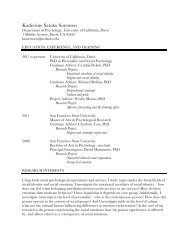The Psychology of Creativity:
The Psychology of Creativity:
The Psychology of Creativity:
Create successful ePaper yourself
Turn your PDF publications into a flip-book with our unique Google optimized e-Paper software.
History <strong>of</strong> <strong>Creativity</strong> Research 27<br />
Helson, R. (1999). Institute <strong>of</strong> Personality Assessment and Research. In M. A. Runco & S. Pritzker (Eds.),<br />
Encyclopedia <strong>of</strong> creativity (Vol. 2, pp. 71-79). San Diego: Academic Press.<br />
Hilts, V. L. (1975). A guide to Francis Galton’s English Men <strong>of</strong> Science. Philadelphia: American Philosophical<br />
Society.<br />
Hollingworth, L. J. (1942). Children beyond 180 IQ: Origin and development. Yonkers-on-Hudson, NY: World<br />
Book.<br />
James, W. (1880, October). Great men, great thoughts, and the environment. Atlantic Monthly, 46, 441-459.<br />
James, W. (1902). <strong>The</strong> varieties <strong>of</strong> religious experience: A study in human nature. London: Longmans, Green.<br />
Jauovec, N. (1999). Brain biology and brain functioning. In M. A. Runco & S. Pritzker (Eds.), Encyclopedia <strong>of</strong><br />
creativity (Vol. 1, pp. 203-212). San Diego: Academic Press.<br />
Johnson-Laird, P. N. (1993). Human and machine thinking. Hillsdale, NJ: Lawrence Erlbaum.<br />
Köhler, W. (1925). <strong>The</strong> mentality <strong>of</strong> apes (E. Winter, Trans.). New York: Harcourt, Brace.<br />
Koza, J. R. (1992). Genetic programming: On the programming <strong>of</strong> computers by means <strong>of</strong> natural selection.<br />
Cambridge, MA: MIT Press.<br />
Koza, J. R. (1994). Genetic programming II: Automatic discovery <strong>of</strong> reusable programs. Cambridge: MIT Press.<br />
Kulkarni, D., & Simon, H. A. (1988). <strong>The</strong> process <strong>of</strong> scientific discovery: <strong>The</strong> strategy <strong>of</strong> experimentation.<br />
Cognitive Science, 12, 139-175.<br />
Langley, P., Simon, H. A., Bradshaw, G. L., & Zythow, J. M. (1987). Scientific discovery. Cambridge, MA: MIT<br />
Press.<br />
Lehman, H. C. (1953). Age and achievement. Princeton, NJ: Princeton University Press.<br />
Lombroso, C. (1891). <strong>The</strong> man <strong>of</strong> genius. London: Scott.<br />
Lykken, D. T. (1998). <strong>The</strong> genetics <strong>of</strong> genius. In A. Steptoe (Ed.), Genius and the mind: Studies <strong>of</strong> creativity and<br />
temperament in the historical record (pp. 15-37). New York: Oxford University Press.<br />
MacKinnon, D. W. (1978). In search <strong>of</strong> human effectiveness. Buffalo, NJ: Creative Education Foundation.<br />
Martindale, C. (1990). <strong>The</strong> clockwork muse: <strong>The</strong> predictability <strong>of</strong> artistic styles. New York: Basic Books.<br />
Martindale, C. (1995). <strong>Creativity</strong> and connectionism. In S. M. Smith, T. B. Ward, & R. A. Finke (Eds.), <strong>The</strong><br />
creative cognition approach (pp. 249-268). Cambridge, MA: MIT Press.
















